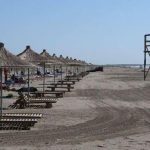TIRANA, Nov. 21 – The International Monetary Fund says Albania needs stronger and more determined efforts to make current slowly recovering growth more inclusive by improving business climate and strengthening rule of law in order to reduce the appeal of emigration among the country’s residents.
The appeal came by an IMF mission visiting the country this month as part of routine consultations with the Albanian government after the role of the Washington-based lender of last resort was revised to advisory in early 2017 following a three-year binding deal accompanied by a loan.
The IMF says it expects Albania’s growth to drop to 3.7 percent next year down from a decade high of about 4 percent this year on lower contribution by the hydro-dependent domestic electricity sector, lower investment from two large energy-related projects already in their final stage and increasing risks to growth in Europe, especially Albania’s main trading partner Italy.
“Much remains to be done to make growth more sustainable and inclusive, and to reduce the appeal of emigration. It is also important to build stronger buffers, especially now that risks to Europe’s economic outlook have increased,” IMF representatives said this week after concluding a two-week visit led by Jan Kees Martijn, the new IMF mission chief for Albania.
The Albanian economy grew between 1 to 4 percent annually in the past nine years, compared to a pre-crisis decade of 6 percent annually, the growth rate estimated to bring tangible welfare to Albanian households, one of Europe’s poorest.
The IMF says the vigorous implementation of judicial sector reform, the enforcement of the rule of law and the anti-corruption strategy, clearer property rights facilitating credit growth and FDI attraction, improving the quality of health care and education and closing infrastructure gaps with regional peers are key to promoting faster and more inclusive growth, stronger regional integration and blunt the appeal of emigration.
In particular, improving the quality of healthcare and education is described as critical for curtailing the deepening shortage of skilled labor in Albania, a country’s which already has one of world’s top per capita migration rates and where polls shows one out of two would consider leaving the country if they were given the opportunity.
“The need for upgrading education, health care, and infrastructure towards European standards requires raising both the quality and the level of spending. In particular, spending on education remains low while skills shortages are a serious constraint to productivity and growth,” says the IMF mission.
Experts says Albanians mostly leave the country because of economic reasons, looking to escape poverty in their homes but also to integrate into leading European economies and take advantage of better education, health and social protection infrastructure for their families.
High migration rates and rapidly ageing population pose key threats to Albania’s labor productivity which already remains Europe’s poorest performing, the World Bank has warned in a recent report.
Albania has around 1.2 million migrants abroad, almost 40 percent of its 2.8 million resident population, making it one of the countries with the highest per capita migration around the world in the past quarter of century of the country’s transition to democracy and a market economy.
Massive migration, mainly to Italy and Greece, the hosts of around 1 million Albanian migrants, has also contributed to lower birth rates in the country with a series of negative economic and social effects for the country’s longer term prospects.
During the past five years, migration renewed with a new wave of economic migrants, mainly seeking ungrounded asylum in rich EU countries such as Germany and France. More than 100,000 Albanians have sought international protection in EU member states since 2014, placing Albanians on a top 10 list of asylum-seeking citizens dominated by war-torn Asian and African countries, according to Eurostat, the EU’s statistical office. However, only few thousands asylum-seekers managed to obtained protection status in EU countries due to Albania being considered a safe country that is a NATO member and an EU aspirant hopeful of launching accession talks next year.
While asylum-seeking has curbed, more and more have turned to learning German and legally move to Europe’s leading economy, in a phenomenon that has not spared skilled professionals such as doctors and nurses leaving the country.
Containing risks
IMF representatives also warn of a series of risks facing the Albanian economy that are mainly related to the rapid increase in public-private partnerships, budgetary arrears and tax cuts or preferential treatments that the government is offering, stressing the need for key reforms that would also help Albania in its pursuit of further integration with the European Union.
“Key reforms include strengthening the rule of law and economic institutions, removing obstacles to higher private savings and investment, and reducing public debt at a faster pace by enhancing the management of public investments and broadening the revenue base. In addition, safeguarding financial stability within the changing architecture of the banking sector increases the complexity of financial supervision,” says the IMF.
The IMF reiterates the need to promote a competitive bidding process by halting the acceptance of unsolicited proposals favoring private companies through bonuses as the government pursues with its ambitious PPP program to upgrade key road, health, education and waste management infrastructure.
Finance Minister Arben Ahmetaj has hinted the government will scrap the unsolicited proposal procedure that has proved decisive for most PPP contracts starting July 2019.
“While the projected PPP-related spending remains below the legal limit of 5 percent of tax revenues, this leaves little room for any additional government-funded PPP projects,” says the IMF, which has earlier warned PPP arrears could pose a threat to Albania’s debt reduction agenda.
The IMF also warns about immediately addressing the issue of rising central and local government arrears, estimated at 1.5 percent of Albania’s GDP, around €180 million, with a considerable part involving accumulated VAT refunds to major energy-related investment which the finance ministry says it has agreed to refund in scheduled instalments in order not to affect revenue growth.
“Given the absence of fiscal space, we strongly urge the authorities to refrain from introducing ad-hoc tax cuts, exemptions, or preferential treatments and consider rolling back those already implemented,” says the IMF.
The Albanian government is offering a series of tax incentives and tighter rules against tax evasion for next year in a carrot and stick approach ahead of the upcoming mid-2019 local elections.










